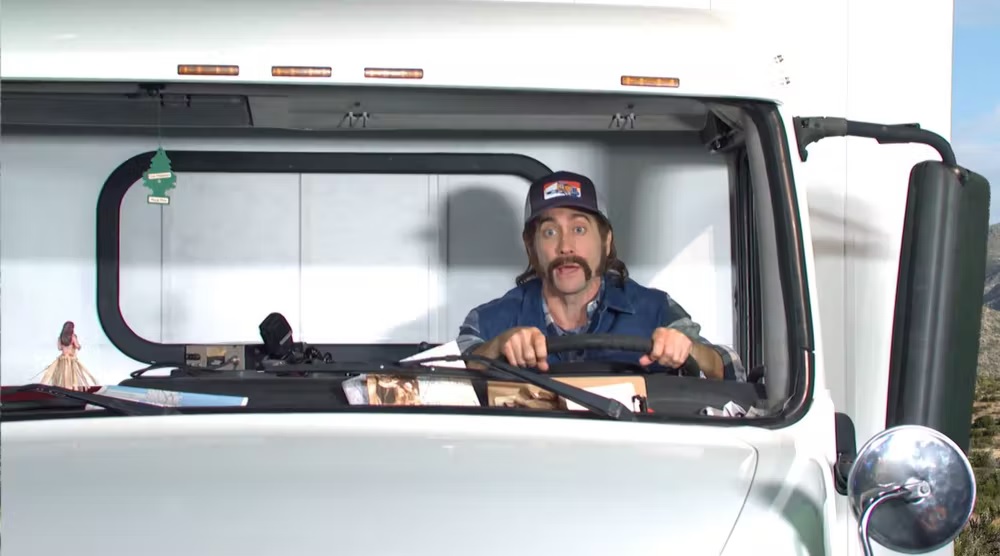Today’s pop culture might deem it OK to undermine professional truck drivers, but it’s wrong on so many levels.
Anyone in the industry who watched the April 9 Saturday Night Live parody that poked fun at truck drivers likely had the same reaction as our editorial team: “Wow. That was dumb.”
The skit, “Truck Stop CD,” features actor Jake Gyllenhaal as a truck-driving crooner, who sings about ghost truckers, urinating in bottles, and long days on the road missing his wife—who appears for a duet advising her husband not to forget which cup in his cab is an actual beverage and which is urine.
Laughing at people urinating in bottles while driving might have been funny when I was 13. Then again, that was the last time SNL was funny.
The problem with skits like this—albeit satirical—is truck drivers are up against these stereotypes all the time. Rather than being considered the professional and essential workforce they are, pop culture tells society it’s OK to undermine them and the work they do. But it’s wrong on so many levels.
For one, many commercial drivers aren’t met with even the basics of human respect and decency when they enter certain facilities. The problem worsened during pandemic restrictions and social distancing at the height of COVID-19, and most recently Rep. Jason Silvis (R-Pennsylvania) shed light on the problem when he authorized legislation to require truck drivers access to restrooms when picking up or dropping off shipments.
House Bill 2465 creates the Truck Driver Restroom Access Act, which would require retail establishments, shippers, receivers, and terminal operators to give truck drivers access to indoor or portable toilets during regular business hours.
“Even before COVID, access to restrooms was a problem for these drivers who cannot easily park at a gas station due to the size of their vehicles,” Silvis, a former commercial driver, stated. “In addition, many times they are forced to wait in their trucks for hours for their turn to unload or be reloaded. Access to bathroom facilities is a sanitary issue that needs to be addressed.”
Around the same time as the SNL skit, Last Week Tonight with John Oliver on HBO aired a segment on the trucking industry. During this episode, Oliver jokingly pointed to various extreme trucking reality TV shows before getting serious: “Trucks are more than just a staple of reality TV,” he said.
“They’re a vital part of our economy, covering more than 70% of the tonnage that moves around America,” Oliver added. “And the drivers involved know just how much this country relies on them.”
Oliver correctly points to the problem of high driver turnover and ongoing retention challenges within the industry. He also highlighted some of the problems that plague drivers today. They often aren’t paid for detention time. Some might be labeled as independent contractors, even when they only work for one company, and as a result, don’t receive benefits and end up paying their own expenses. And some drivers bound by predatory lease and work agreements have found themselves owing the company at the end of the workweek.
The good news is the Biden administration is tackling some of these injustices in its Trucking Action Plan. For example, the plan includes a Truck Leasing Task Force to address predatory leasing arrangements and identify actions that could make leases more equitable and transparent.
Fleets also are using technology to unlock efficiencies and take better care of their drivers. One for-hire fleet I spoke with uses technology to complement human strengths and compensate for operational weaknesses. Fleets can also utilize TMS software to rate and score shipper facilities, giving drivers a well-deserved voice and seat at the table. More and more carriers and shippers alike are also using these systems to provide drivers more dedicated routes and pay them for detention time.
The industry has made vast improvements for professional drivers, but it can’t afford to falter on ensuring that they are compensated properly and that their basic human needs are met.
It’s important to remind people that there is nothing we eat, wear, drink, drive, put in our homes, etc., that doesn’t move on a truck. It would be wise for SNL writers to think twice before mocking the men and women who deliver all the supplies necessary to perform their sketches. Keep in mind, those set props were delivered by a human being—possibly a person who might not have had the luxury of using a restroom along the way.
Source https://www.fleetowner.com/





